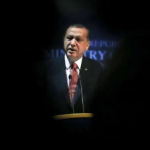The Turkish pro-democracy opposition desperately needs to defeat Erdogan. But not by building up their candidate, Ekrem Imamoglu, as an infallible ‘savior’
Walking along a central Istanbul thoroughfare, I soon found myself being pushed and shoved by a crowd. People were rushing to take selfies with a man in a navy suit walking to my left.
It turned out that he wasn’t an actor or a television celebrity, as I had initially assumed. He was none other than Ekrem Imamoglu, the Turkish opposition politician who served just 17 days as Istanbul mayor before his narrow election victory was snatched away from him. Bowing to government pressure, the Supreme Electoral Council ordered a re-run. However, in Turkey, Imamoglu’s popularity continues to soar.
Turkish democracy has taken quite a hit. Following the attempted coup of 2016, the country’s firebrand president, Recep Tayyip Erdogan, managed to accumulate unprecedented power.
During the two-year post-coup state of emergency, he purged state institutions of enemies, closed down media outlets and ushered in constitutional reforms to give him even more centralized power through a referendum that was not considered free or fair by international observers. Meanwhile, Kurdish-oriented parties have had their leaders arrested under dubious terrorism-related charges and their local politicians removed from office.
Presidential Press Service via AP, Pool
So, the excitement elicited by the 48-year-old soft-spoken Imamoglu is certainly understandable. By speaking the language of democracy, mutual respect and focusing on political reform, Imamoglu managed to defeat President Erdogan’s preferred candidate for Istanbul mayor, former prime minister Binali Yildirim.
Already, there is talk about Imamoglu one day running against Erdogan for president.
However, pinning so much hope on a single individual is dangerous. The controversial, not to say racist, British politician Enoch Powell once said, “All political lives, unless they are cut off in midstream at a happy juncture, end in failure.”
How true this is of many a political figure – from those whose lives were cut short such as Martin Luther King, John F. Kennedy or Yitzhak Rabin, to those who inspired hope only to later disappoint, like Tony Blair or Barack Obama.
In much of the world, not least the Middle East, charismatic figures, from Egypt’s Gamel Abdel Nasser to King Hussein of Jordan, fostered cults of personalities which enabled them to manipulate constitutions and reign in on dissent.
But the public face of personalities can be deceptive. Before the 1979 Iranian revolution, for example, many saw the exiled Ruhollah Khomeini as a pious and gentle Gandhi-like figure. Little did they know the violence that he was both capable and willing to use in order to hijack the revolution and transform Iran into the Islamic Republic.
REUTERS/Murad Sezer
Indeed, larger-than-life personalities in the region have a good record of trampling over institutions and dominating the state. Alas, Turkey is no exception.
The history of Turkish politics reads like a list of leaders who each sought to dominate the state in order to leave their stamp on the political landscape.
The country’s first president, Mustafa Kemal Ataturk, led a comprehensive secular and modernist state-building exercise. Following Ataturk was Ismet Inonu, Adnan Menderes, Bulent Ecevit, Turgut Ozal, Suleyman Demirel and Tansu Ciller, just to name a few. Turkey’s most recent domineering political figure is Erdogan, co-founder of the ruling Justice and Development Party, who follows an Islamically inspired worldview and wants to raise a “pious generation” while pushing nationalist sentiment too.
It is in this context that one must understand the rise of Imamoglu and the danger that his over-hyped campaign represents. On the trail, his rallies have often been emotionally-charged affairs, and every “event” is documentaed, translitted and amplified to his 2.5 million Twitter followers.
Excitement has reached such levels that passionate crowds have mobbed the politician’s campaign bus and children signalled hearts and blew flurries of kisses. After the decision to rerun the election, videos circulated of old ladies throwing the politician teary eyed hugs.
Imamoglu’s popularity is more akin to a rock star or even a cult leader than that of a politician.
Ahead of the election re-run, Imamoglu’s election material bears Imamoglu’s facial profile with white, black and red backgrounds, clearly inspired by Obama. Instead of “Yes, we can” the posters read, “Her sey cok guzel olacak” – which roughly translates to “Everything will be alright,” a sentence Imamoglu borrowed from a fawning young supporter.
But politicians are not idols. At best, placing a political figure on a high pedestal is a recipe for disappointment. It also encourages inefficiency and ineffective leadership as it distracts from the real task of running an effective office and protecting democratic institutions. It also feeds over confidence and complacency rather than humility and respect for outside opinion.
At worst, idolizing politicians risks the suspension of a voter’s critical faculties in order to lend support to an individual who is, at worst, nefarious – or is just as fallible as the rest of us.
If anything, a good dose of skepticism, if not contempt, is needed to balance the over-produced hype those wishing to enter political office. That goes for Imamoglu, Erdogan – or anyone else for that matter.
By Simon A. Waldman
Dr Simon A. Waldman is an associate fellow at the Henry Jackson Society and a visiting research fellow at King’s College London. He is the co-author of The New Turkey and Its Discontents (Oxford University Press, 2017). Twitter: @simonwaldman1
Source: Haaretz





